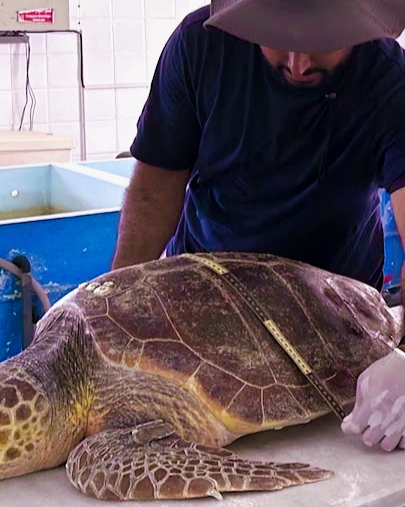A shocking video that has been widely circulated on social media has triggered a wave of outrage in Tunisia, after it documented the moment an endangered sea turtle was caught and slaughtered on a tourist boat off the coast of the island of Goria in the Monastir governorate, east of the country.
The video showed the boat owner skinning and cleaning the turtle for the purpose of consuming its meat or selling it, in a scene described by environmental activists as a "horrific crime" and "brutal act" that violates environmental laws and poses a threat to the ecological balance in the area.
It is believed in some areas that sea turtle meat has medicinal benefits, which drives some to consume it despite warnings.
The turtle that was slaughtered belongs to the species "Caretta caretta," which is considered one of the rare and endangered species, facing the risk of extinction due to overfishing, destruction of its natural habitat, and marine pollution that threatens its nesting areas on the beaches.
In a swift development, local authorities in the Monastir governorate announced the revocation of the tourist boat's license and the suspension of the captain for investigation, in response to public and human rights demands for the need to take strict measures against anyone who violates protected marine life.
Environmental activist Moaz Haddad stated that "the slaughter of the sea turtle is considered a crime against the environment and against Tunisian law, which prohibits the hunting of sea turtles or trading them or any part of them."
He emphasized that the loss of one turtle is akin to losing a vital link in the marine ecological chain, warning of serious environmental repercussions if such violations are repeated.
Haddad added that Tunisia has witnessed a sharp decline in the number of sea turtles in recent years, especially of the "Caretta caretta" species, due to pollution, overfishing, and the destruction of their nests.
The effects of their absence were evident this summer through the significant increase in jellyfish numbers along the Tunisian coasts, confirming their essential role in marine ecological balance.
It is noteworthy that Tunisian law prohibits the hunting or capture of sea turtles, criminalizes trading them or killing them, and punishes violators with financial fines, as part of the state's efforts to protect biodiversity and endangered species.
Investigations are currently ongoing, amid public demands for more oversight on tourism and marine activities, and for strict measures against anyone who threatens marine life in the country.

